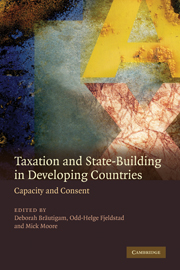Book contents
- Frontmatter
- Contents
- List of figures and tables
- List of contributors
- Acknowledgements
- 1 Introduction: taxation and state-building in developing countries
- 2 Between coercion and contract: competing narratives on taxation and governance
- 3 Capacity, consent and tax collection in post-communist states
- 4 Taxation and coercion in rural China
- 5 Mass taxation and state–society relations in East Africa
- 6 Contingent capacity: export taxation and state-building in Mauritius
- 7 Tax bargaining and nitrate exports: Chile 1880–1930
- 8 Associational taxation: a pathway into the informal sector?
- 9 Rethinking institutional capacity and tax regimes: the case of the Sino-Foreign Salt Inspectorate in Republican China
- 10 Tax reform and state-building in a globalised world
- References
- Index
4 - Taxation and coercion in rural China
Published online by Cambridge University Press: 22 September 2009
- Frontmatter
- Contents
- List of figures and tables
- List of contributors
- Acknowledgements
- 1 Introduction: taxation and state-building in developing countries
- 2 Between coercion and contract: competing narratives on taxation and governance
- 3 Capacity, consent and tax collection in post-communist states
- 4 Taxation and coercion in rural China
- 5 Mass taxation and state–society relations in East Africa
- 6 Contingent capacity: export taxation and state-building in Mauritius
- 7 Tax bargaining and nitrate exports: Chile 1880–1930
- 8 Associational taxation: a pathway into the informal sector?
- 9 Rethinking institutional capacity and tax regimes: the case of the Sino-Foreign Salt Inspectorate in Republican China
- 10 Tax reform and state-building in a globalised world
- References
- Index
Summary
Introduction
Contemporary China faces two fundamental challenges: building the administrative capacity appropriate for a ‘socialist market economy’, and accommodating the increasingly strong pressure for political participation and accountability. In rural China, where developmental policies coexist with predatory local state practices, both these challenges come into play. This chapter deals with burdensome irregular and unpredictable taxation, which has caused peasant resistance, confronting the central government with the task of constructing a system of revenue raising that would fund public goods while minimising abuses of taxpayers by local authorities.
There is a long history of conflict around rural taxation in China. Eighty years ago, Thomas Millard (1926) commented that, in China, ‘revolutions start with the tax collector’. Revolutions and violent resistance are at one end of a continuum of possible responses to abusive taxation and arbitrary imposition of fees. Coercive revenue collection may provide resources to the state, while creating perceptions of unfairness and arbitrariness. Yet fair and predictable behaviour on the part of public agents – and some kinds of clear benefits in return for tax contributions – matter a great deal in building viable states and fostering political participation and accountability. If revenue raising is to make a genuine and lasting contribution to increasing state capacity, governments need to curb extraction and secure societal cooperation.
- Type
- Chapter
- Information
- Taxation and State-Building in Developing CountriesCapacity and Consent, pp. 89 - 113Publisher: Cambridge University PressPrint publication year: 2008
- 14
- Cited by

